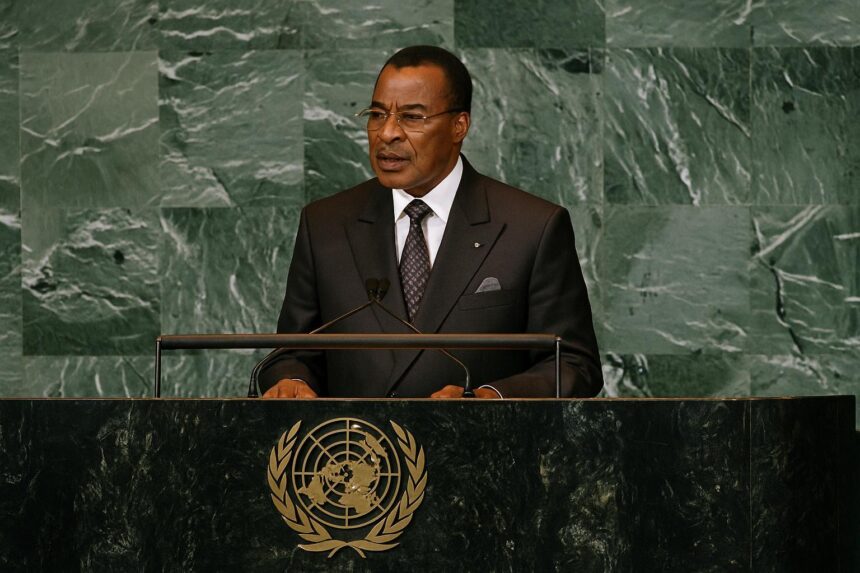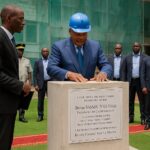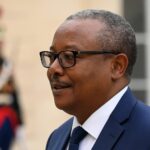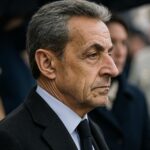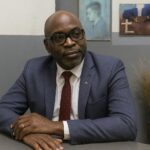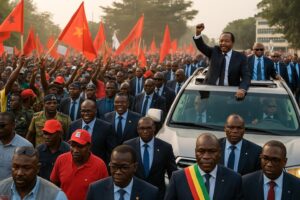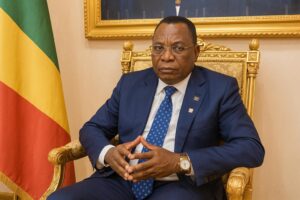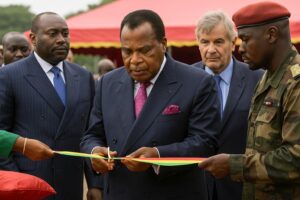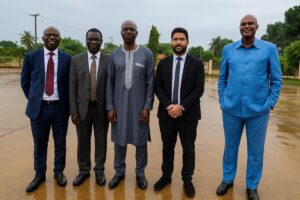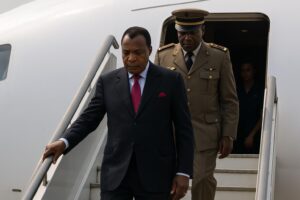Congolese voice resonates at 80th UN session
The marble hall of the United Nations General Assembly hushed shortly after midnight as President Denis Sassou N’Guesso stepped to the green rostrum, offering a firm “Yes” to the lingering question of whether the world body still matters in a decade of turbulence.
- Congolese voice resonates at 80th UN session
- Why Brazzaville insists the UN must evolve
- Security Council in the spotlight
- From climate to debt: Africa’s expectations
- Humanitarian action closer to the ground
- Regional diplomacy at work
- A message that finds echoes
- Next steps on the diplomatic calendar
- Optimism tempered by realism
Speaking during the high-level debate of the 80th session, the Congolese head of state acknowledged the institution’s financial strains and political headwinds, yet declared it “indispensable” provided it evolves, reforms and draws closer to the everyday concerns of the planet’s eight billion inhabitants.
Why Brazzaville insists the UN must evolve
Brazzaville’s diplomacy traditionally champions multilateralism, but officials stress that slow bureaucratic cycles can blunt urgent responses to crises from pandemics to food insecurity. Sassou Nguesso therefore urged streamlined field operations, stronger resident coordinators and more predictable funding to cut overlapping mandates.
The President framed the choice before member states as “courage, solidarity and responsibility,” warning that history will move on without those who hesitate. His language mirrored calls made by several African leaders this week for a UN that listens to regions most exposed to conflict and climate stress.
Security Council in the spotlight
Nowhere is the reform debate more sensitive than at the Security Council. Sassou Nguesso did not outline a detailed blueprint, yet diplomats from Central Africa note that Brazzaville supports an enlarged Council reflecting 21st-century demographics, including at least two permanent African seats, a stance shared by the African Union.
Negotiations on the Council’s future have dragged on for years, hampered by competing models and the veto power of the five permanent members. Observers say Congo’s measured tone seeks to maintain dialogue without antagonising major partners, notably China, France and the United States.
From climate to debt: Africa’s expectations
Beyond institutional mechanics, Sassou Nguesso linked reform to concrete challenges such as forest conservation and sustainable debt relief. Congo’s vast peatlands store gigatonnes of carbon, making the country a “solution nation”, he said, calling for tailored green financing that rewards states that protect critical ecosystems.
He also cited the burden of rising borrowing costs on African economies still recovering from COVID-19. Reform, he said, means aligning UN development agencies with the new global financial architecture discussed in Paris and Nairobi this year, ensuring fair access to capital.
Humanitarian action closer to the ground
On the humanitarian front, the Congolese leader backed the Secretary-General’s initiative to empower resident coordinators, giving them larger budgets and clearer authority during emergencies. “People in distress cannot wait for inter-office cables,” he argued, applauding pilot programmes already tested in the Sahel.
Aid groups welcome the push, citing bottlenecks that plagued the 2022 Kasaï floods response. The UN Office for the Coordination of Humanitarian Affairs notes that faster procurement and unified data platforms saved days in delivering relief this season, offering a template for future disaster management.
Regional diplomacy at work
Congo-Brazzaville often acts as a quiet mediator in Central Africa. Officials in New York highlighted its role in the International Conference on the Great Lakes Region, suggesting that a revitalised UN could better support such regional efforts with flexible funding and rapid expert deployment.
Analysts say this dovetails with Sassou Nguesso’s personal diplomacy, exemplified by past facilitation in the Central African Republic and Chad. By spotlighting success stories, Congo hopes to prove that local ownership, backed by adaptive UN structures, offers a pragmatic route to sustainable peace.
A message that finds echoes
Foreign ministers from Ghana, Indonesia and Ireland, speaking later in the debate, endorsed similar themes, underscoring a cross-regional appetite for change. “We cannot solve tomorrow’s problems with yesterday’s toolbox,” Ghana’s Shirley Ayorkor Botchwey observed, applauding Congo for articulating the frustration of mid-size states.
While agreement on specifics remains elusive, diplomats say the mood in the corridors feels different, with even cautious delegations accepting that budget shortfalls and peacekeeping overstretch demand fresh formulas, not incremental tweaks.
Next steps on the diplomatic calendar
Attention now shifts to the Summit of the Future scheduled for September 2026, where António Guterres wants a formal pact on global governance. Congo’s mission plans to convene an informal African caucus early next year to harmonise positions and push a unified reform agenda.
Civil society voices in Brazzaville, from youth networks to business chambers, intend to keep the pressure on through public forums and social media campaigns. They argue that a stronger UN ultimately means more predictable support for domestic priorities like broadband expansion and vocational training.
Optimism tempered by realism
Even supporters concede that recalibrating a 193-member organisation will take patience. Yet the Congolese delegation leaves New York encouraged. “Every journey begins with a step,” a senior envoy smiled, referring to a local proverb. The step, he insisted, has now been taken.
As the gavel dropped to close the late-night session, Sassou Nguesso’s appeal lingered in the hall. The challenge is clear: transform an indispensable institution without fracturing the fragile consensus that keeps it alive. For Congo and many others, the task is bold—yet unavoidable.

